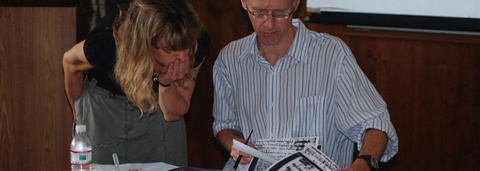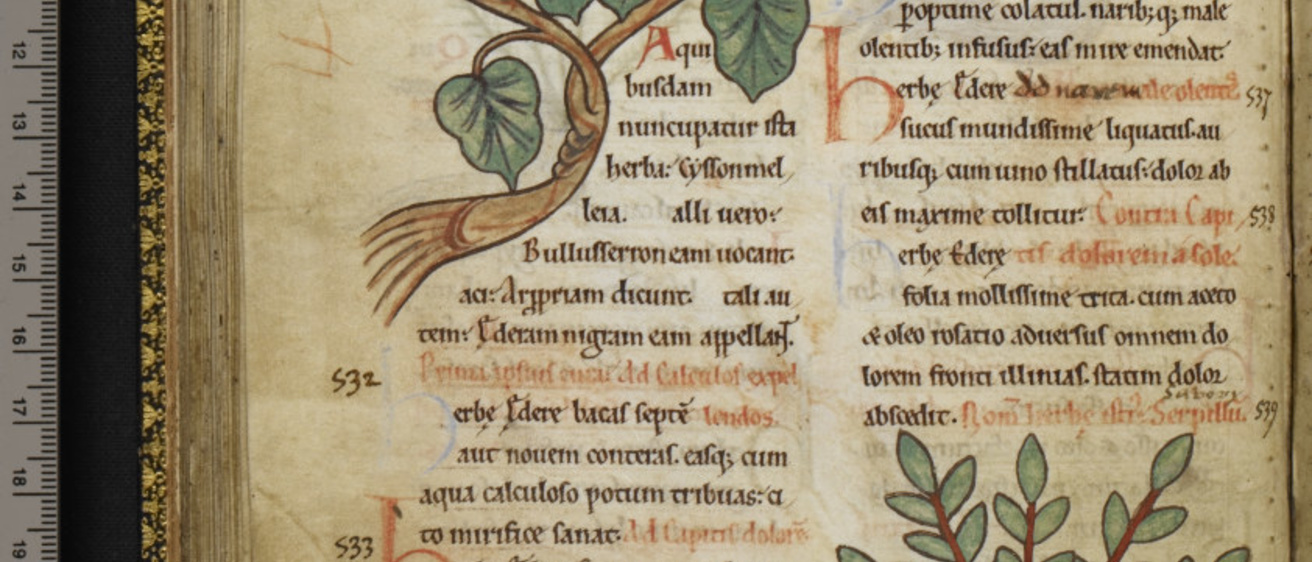NEH-Funded Seminar Provides Hands-On Experience
Most of what we know about the literature, art, and science of the Middle Ages has been interpreted by scholars from texts hand-scribed on parchment. And though they return to these illuminating manuscripts for more clues, few scholars deeply understand the process of their production.
Providing scholars with hands-on experience is the central goal of “The Materiality of Medieval Manuscripts: Interpretation Through Production,” one of only six prestigious National Endowment for the Humanities-funded seminars for college and university professors that will meet across the United States in the summer of 2015. Seminar director Jonathan Wilcox (English, CLAS) will host his group of competitively selected scholars at the Obermann Center this summer.
Scraping Animal Skins, Cutting Quills
“Codicology and palaeography—study of the physical form of a book and of the handwriting within it—have long been fundamental tools for scholars of the Middle Ages, both those trained in the old and the new philology,” Professor Wilcox (English, CLAS) explains. “Yet few medievalists have cut a quill or written on parchment with oak-gall ink, still less scraped and stretched an animal skin, cut and folded parchment, then designed and organized text and decoration on the resulting pages.”
Wilcox and four seminar faculty, all from the Center for the Book (Graduate College)—Tim Barrett, Sara Sauers, Julie Leonard, and Cheryl Jacobsen—will plunge sixteen scholars into deeper understanding of the history and interpretation of texts through the gloriously messy process of medieval book production.
The participants, who hail from a range of disciplines, including literature, history, art history, music, religion, and philosophy, will meet at the Obermann Center and also in the Center for the Book studio space in North Hall between June 15 and July 10. Workshop time will include lessons in parchment making, papermaking, page design, calligraphy, bookbinding, and conservation. Hands-on sessions will be interleaved with seminar discussion of the way scholarship engages manuscript culture.
Beyond Digital

Cheryl Jacobsen (Center for the Book, Graduate College [pictured left along with Jonathan Wilcox]), a master calligrapher and seminar faculty member, believes that physically creating manuscripts provides an intimate learning experience for scholars of the Middle Ages.
“Knowing what scribes experienced on a daily basis really changes the way you look at things,” Jacobsen said. “Some scholars go through and study manuscripts without ever feeling or touching one.”
While scholars of the Middle Ages used to have to travel to the archival home of a manuscript in order to study it—a time-consuming and costly endeavor—a significant number of manuscripts are now available via high-quality digitization. While no one would argue with the convenience of online manuscripts, Wilcox and Jacobsen both believe something is lost without the tactile experience.
“This seminar is all about giving people a detailed sense of what you lack from digital reproduction,” says Wilcox. “We might call it the Philology of Smell.”
2008 Obermann Summer Seminar Served as Pilot
The seminar is modeled on the University of Iowa 2008 Obermann Summer Research Seminar, “Medieval Manuscript Studies and Contemporary Book Arts: Extreme Materialist Readings of Medieval Books.” The pilot project gathered ten scholars to participate in two weeks of discussion and sessions on medieval manuscripts and their creation. The result of the project was the publication of an essay collection edited by Wilcox, Scraped, Stroked, and Bound: Materially Engaged Readings of Medieval Manuscripts.
The earlier seminar demonstrated the depth of the University of Iowa’s expertise in the area of medieval manuscript production. Wilcox says it is a special honor to host the NEH-funded seminar here, not only because so few are funded, but also because in the past, NEH seminars that have centered on medieval manuscripts have taken place in Britain or Europe. "It’s quite distinctive to get the honor of having one here," he says. "It demonstrates the wealth of special skills that Iowa has to offer to the world.”
